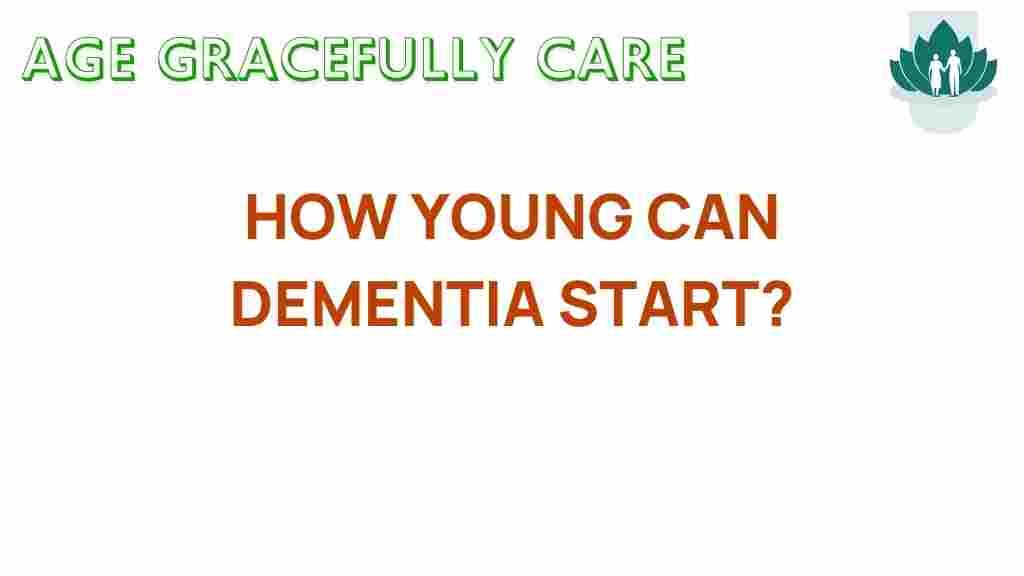Unraveling the Mystery: How Young Can Dementia Begin?
Dementia is often associated with aging, but recent studies reveal that cognitive decline can occur much earlier than expected. Early onset dementia, defined as dementia that occurs before the age of 65, presents unique challenges and raises questions about its causes, symptoms, and prevention strategies. Understanding this neurological disorder is crucial for individuals and families affected by it, as well as for mental health professionals.
Understanding Dementia and Its Types
Dementia is not a specific disease but rather a term that describes a range of symptoms associated with a decline in cognitive function. These symptoms can include:
- Memory loss
- Difficulty communicating
- Challenges with reasoning and problem-solving
- Changes in mood and behavior
There are several types of dementia, with Alzheimer’s disease being the most common. Other types include vascular dementia, frontotemporal dementia, and Lewy body dementia. Each type has its own characteristics, but all lead to cognitive decline and impact daily life.
The Age Factor: What Is Early Onset Dementia?
Early onset dementia refers to cases where symptoms appear in individuals under 65. While it is less common than dementia in older adults, it significantly affects the lives of those diagnosed and their families. The causes of early onset dementia can be genetic, environmental, or a combination of both.
Risk Factors for Early Onset Dementia
Identifying risk factors is essential for understanding how early onset dementia may develop. Some known risk factors include:
- Genetics: Family history of dementia can increase the risk.
- Neurological disorders: Conditions such as Parkinson’s disease can lead to cognitive decline.
- Traumatic brain injury: A history of head trauma may increase the likelihood of developing dementia.
- Substance abuse: Alcohol and drug abuse can contribute to cognitive decline.
- Other health issues: Conditions like diabetes, high blood pressure, and obesity can also be risk factors.
Recognizing the Symptoms of Early Onset Dementia
Awareness of the symptoms is critical for early diagnosis and intervention. Common symptoms of early onset dementia include:
- Memory loss: Forgetting recent events or conversations.
- Difficulty concentrating: Struggling to focus on tasks or conversations.
- Personality changes: Noticeable shifts in mood or behavior.
- Language difficulties: Trouble finding the right words or following conversations.
- Disorientation: Getting lost in familiar places or becoming confused about time.
If you or someone you know is experiencing these symptoms, it is crucial to consult a healthcare professional for evaluation and diagnosis.
Step-by-Step Process: Diagnosing Early Onset Dementia
The diagnosis of early onset dementia involves several steps:
- Medical history review: The doctor will take a detailed medical history, including family history.
- Physical examination: A thorough physical examination to rule out other causes of symptoms.
- Cognitive tests: Standardized tests to assess memory, problem-solving skills, and other cognitive functions.
- Neuroimaging: Imaging tests, like MRI or CT scans, to check for brain abnormalities.
- Laboratory tests: Blood tests to identify any underlying health issues.
Early diagnosis can help in planning treatment and support for individuals experiencing cognitive decline.
Prevention: Can Early Onset Dementia Be Prevented?
While there is no guaranteed way to prevent dementia, certain lifestyle changes may reduce the risk:
- Maintain a healthy diet: A balanced diet rich in fruits, vegetables, whole grains, and healthy fats can support brain health.
- Stay physically active: Regular exercise can improve blood flow to the brain and promote overall well-being.
- Engage in mental activities: Puzzles, reading, and learning new skills can help keep the mind sharp.
- Socialize: Maintaining strong social connections can enhance mental health and cognitive function.
- Avoid smoking and excessive alcohol: Reducing these risk factors is beneficial for overall health.
For more information on mental health and cognitive decline, visit the National Institute of Mental Health.
Troubleshooting Tips: When to Seek Help
If you notice signs of cognitive decline in yourself or a loved one, consider the following tips:
- Document symptoms: Keep a record of symptoms and their frequency to discuss with a healthcare professional.
- Communicate openly: Encourage open conversations about mental health and cognitive concerns.
- Seek support: Reach out to support groups and resources for those affected by dementia.
- Educate yourself: Learn about dementia through reputable sources and community programs.
Understanding the risks, symptoms, and prevention strategies surrounding dementia can empower individuals and families in navigating this challenging condition.
Conclusion
The mystery of how young dementia can begin is gradually being unraveled through research and awareness. Early onset dementia is a significant concern, affecting not only individuals but also families and communities. By recognizing risk factors, symptoms, and potential preventive measures, we can better equip ourselves to address this neurological disorder. If you suspect that you or someone you know is experiencing cognitive decline, do not hesitate to seek help from a healthcare professional.
For further reading on dementia and related topics, check out this informative external resource on Alzheimer’s disease and early onset dementia.
By fostering awareness and understanding, we can contribute to better mental health outcomes for those affected by dementia, ensuring a supportive environment for individuals facing cognitive decline.
This article is in the category Health and created by AgeGracefullyCare Team
